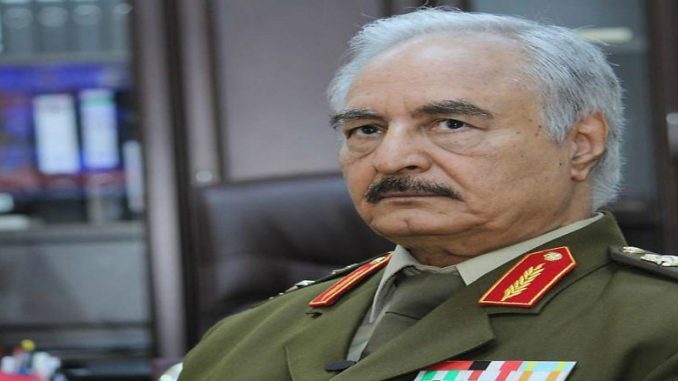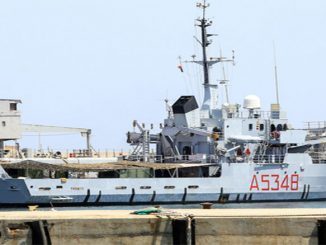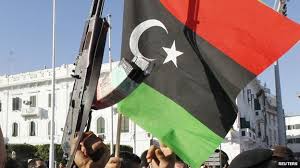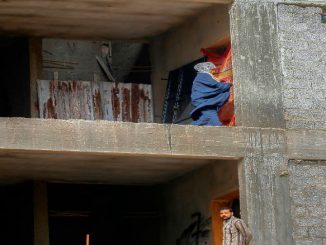
The day after the battle for the Libyan town of Gharyan, burnt-out cars were flipped on the side of the highway and only a few shop owners opened their doors to see if they could do business.
Local farmers picked through bombs dropped from drones the night before.
“This is the third bomb that dropped last night,” said Ossama, pointing to a broken shell outside a suburban compound Friday. “People are still afraid.”
Last week’s battle could be a turning point in the war surrounding the Libyan capital, Tripoli, which has largely been a bloody stalemate, according to soldiers fighting for Tripoli’s western forces. Supply lines for the eastern forces that first attacked three months ago have now been cut, they say.
Eastern forces have vowed to continue the fight, threatening both Tripoli forces and their international allies. On Monday, eastern forces threatened further airstrikes, including Tripoli’s airport.
For both sides, this not a just a battle for one city, it is a fight for the heart and future of Libya. If western forces win, Libya can remain divided and return to slowly making efforts to reunite through diplomacy and elections. If eastern forces win, it could usher in a new era for Libyan strongmen.
At a market in central Tripoli, shop owners say the city has become more crowded, tense and poor since this latest war began. More than 650 people have been killed in three months of fighting, and more than 94,000 have fled their homes.
Sellers in the market are divided on what kind of leadership they want, but united in their exhaustion after eight years of wars, economic turmoil and national divisions.
“We are scared and surrounded,” said Abdullah, 50, who runs a small shoe store with his cousin, Mohammed. “But the war is out of our hands. We wanted a peaceful solution, but now, I don’t know.”
The divide
Libya has been functioning essentially under two governments for roughly five years: the internationally recognized government in the west known as the Government of National Accord, and the eastern government, lead by Field Marshal Khalifa Haftar, a strongman heading the Libyan National Army.
The war began in early April, when Haftar declared he would take the western capital Tripoli by force, and unite the country under the LNA. Forces loyal to the GNA have been repelling attacks ever since, and neither side has shown any sign of giving up.
Gharyan, the strategic town re-captured by the GNA last week, is about 80 kilometers (50 miles) south of Tripoli. Haftar’s forces took the town as the assault began in April, using it to launch attacks on the Tripoli suburbs.
At the market in Tripoli, some sellers say the idea of a single man leading the country is ultimately a good idea. Life was easier before the 2011 ouster and death of dictator Muammar Gadhafi, according to Mohammad, 43, selling shoes in the Tripoli market with his cousin.
“Everything was more stable and secure,” he said, quickly adding that he was not expressing support for any particular leader. A few blocks away in Tripoli’s central Martyr’s Square, banners of Haftar’s picture hang, stamped with the word “wanted.”
But in the beaten-down town center of Gharyan, Saddam Abdul-Gheni Ghazowi says he fought for freedom against Gadhafi, and will continue to fight. When Haftar’s forces came to town, he fled his home and his job in an oil field to join the GNA forces.
“I left home because I wanted to be ready to liberate my town,” he said. “And we’ll keep fighting until Haftar is gone.”
Complex loyalties
While many Libyans are squarely in support of either the GNA or the LNA, loyalties in Libya and among their international allies are not divided along simple lines. Tribal loyalties run deep among the Libyan public, and local leaders often command more authority than the leaders running the eastern and western governments.
Tripoli’s forces are backed by the United Nations, but Haftar’s forces have their own allies in Egypt, the United Arab Emirates and Saudi Arabia. Turkey, Italy and Britain have all shown support for the GNA, with Haftar’s forces threatening Turkish interests in Libya after their defeat in Gharyan
But even international alliances are not clear-cut. For example, the United States officially supports the GNA and the peace process. But in April, more than a week after Haftar’s assault on Tripoli began, U.S. President Donald Trump called Haftar on the phone to discuss “a shared vision” for Libya. The State Department later affirmed U.S. support for Tripoli.
In Zintan, a town in the mountains southwest of Gharyan, two children of an officer played in a parking lot storing tanks and other heavy weapons on Thursday evening. Essam Abdullah, a GNA soldier, said he fought with Haftar when they were fighting extremist militants for Libya’s oil fields, which hold the largest reserves in Africa and the 9th largest in the world.
Abdullah left Haftar’s forces to fight with Tripoli when the leader’s rhetoric expanded his definition of “extremist militant” to include established military groups in the west that are not affiliated with extremist ideologies.
“We fought to take our oil fields back from terrorists,” Abdullah said. “We thought he was building a new army for Libya. But it turns out he was building a new army for himself.”
.



